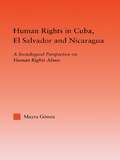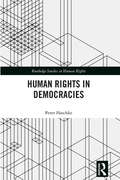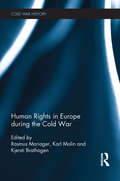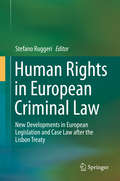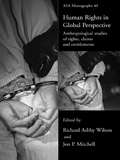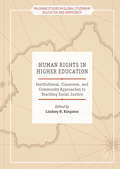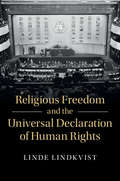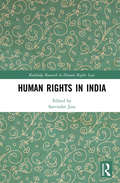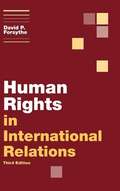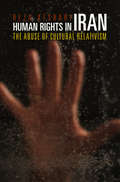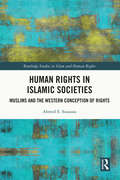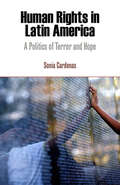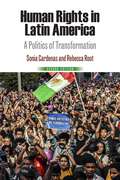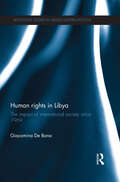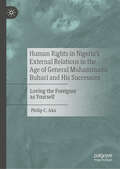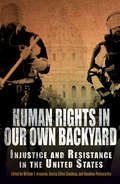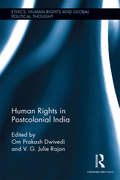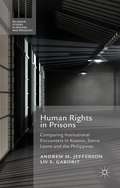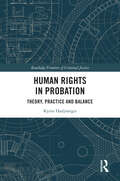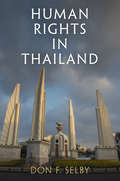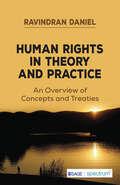- Table View
- List View
Human Rights in Cuba, El Salvador and Nicaragua: A Sociological Perspective on Human Rights Abuse (Studies in International Relations)
by Mayra GomezThis book presents a historical perspective on patterns of human rights abuse in Cuba, El Salvador and Nicaragua and incorporates international relations in to the traditional theories of state repression found within the social sciences.
Human Rights in Democracies (Routledge Studies in Human Rights)
by Peter HaschkeViolations of the right to the physical integrity of the person, such as torture, cruel and unusual punishment, extra-judicial executions, disappearances, and political imprisonment have long been treated as an anomaly in democratically governed societies. In the current literature on human rights, violations of this right are by-and-large seen as the hallmark of autocratic and repressive regimes. This study takes on this dominant paradigm and shows not only that the common assumption that democratic countries effectively limit human rights abuse is simply wrong, but that its widely accepted theory of what drives human rights violations accounts for only a small part of these abuses at best. Haschke shows that despite the increasing numbers of countries that are democracies, and despite growing numbers of national signatories to international treaties prohibiting human rights abuse, the number of allegations has not declined. This book also demonstrates that the bulk of this abuse, which takes the form of torture and ill-treatment, extra-judicial killings, rape, and the like, is committed against marginal members of society, seeming to reveal environments that enable agents of the state to abuse those with whom they are in contact. This violence is found in democracies and dictatorships alike. This work will be of interest to students and scholars of international relations, human rights and comparative politics.
Human Rights in Europe during the Cold War (Cold War History)
by Rasmus Mariager Karl Molin Kjersti BrathagenThis book provides an overview of the establishment, dispersion and effects of human rights in Europe during the Cold War. The struggle for human rights did not begin at the end of the Second World War. For centuries, political associations, religious societies and individuals had been fighting for political freedom, religious tolerance, freedom of expression, freedom of thought and the right to participate in politics. However, the world was awakened by the atrocities of the Second World War and the idea that every person should have certain perpetual and inalienable rights was set out in The Universal Declaration of Human Rights (UDHR) from 1948, which contained an enumeration of international human rights standards. Adopting an interpretative framework which pulls together universal ideas, values and principles of human rights, Human Rights in Europe during the Cold War demonstrates how conflicting interests collided when the exact meaning of human rights was established. It also discusses various approaches to the idea of imposing respect for human rights in countries where they were systematically violated and assesses the outcome of international accords on human rights, in particular the 1975 Helsinki Final Act. In conclusion, this volume proposes that human rights functioned as moral support to the opposition in repressive regimes and that this was subsequently used as a tool to further system changes. Based on new archival research, this book will be of much interest to students of Cold War studies, human rights, European history, international law and IR in general.
Human Rights in European Criminal Law
by Stefano RuggeriThis book deals with human rights in European criminal law after the Lisbon Treaty. Doubtless the Lisbon Treaty has constituted a milestone in the development of European criminal justice. Not only has the reform following the Treaty given binding force to the EU Charter of Fundamental Rights, but furthermore it has paved the way for unprecedented forms of supranational legislation. In this scenario, the enforcement of individual rights in criminal matters has become a core goal of EU legislation. Alongside these developments, new interactions between national and supranational jurisprudences have emerged, which have significantly contributed to a human rights-oriented approach to European criminal law. The book analyses the main developments of this complex phenomenon from an interdisciplinary perspective. Criminal and procedural law, constitutional law and comparative law must thus be combined to achieve a full understanding of these developments and of their impact on national law.
Human Rights in Global Perspective: Anthropological Studies of Rights, Claims and Entitlements (ASA Monographs)
by Richard Ashby Wilson Jon P. MitchellIn the West we frequently pay lip service to universal notions of human rights. But do we ever consider how these work in local contexts and across diverse cultural and ethical structures? Do human rights agendas address the problems many people face, or are they more often the imposition of Western values onto largely non-Western communities?Human Rights in a Global Perspective develops a social critique of rights agendas. It provides an understanding of how rights discussions and institutions can construct certain types of subjects such as victims and perpetrators, and certain types of act, such as common crimes and crimes against humanity. Using examples from the United States, Europe, India and South Africa, the authors restore the social dimension to rights processes and suggest some ethical alternatives to current practice.
Human Rights in Higher Education: Institutional, Classroom, And Community Approaches To Teaching Social Justice (Palgrave Studies In Global Citizenship Education And Democracy Ser.)
by Lindsey N. KingstonThis book focuses on human rights education (HRE) in higher education, with an emphasis on supporting undergraduate education for social justice and global citizenship at the institutional, classroom, and community levels. Drawing from the work of human rights scholars and advocates at Webster University, Kingston begins a critical discussion about the potential of HRE on college campuses and beyond. Chapter contributors address the institutional issues inherent to building a “human rights campus,” promoting just governance models, facilitating student research, and fostering inclusive campus communities. They further explore opportunities within the classroom by highlighting dynamic courses on global sustainable development and post-genocide reconciliation, as well as considering how to create trauma sensitive learning spaces and utilize photography as a human rights teaching tool. Finally, scholar-advocates detail how HRE can be expanded to include the broader community—including teaching critical criminology to aspiring police officers, facilitating community dialogue through academic conferences, and engaging in social justice work related to access to justice, domestic violence, and human trafficking.
Human Rights in History: Cold War Germany, the Third World, and the Global Humanitarian Regime
by Young-Sun HongThis book examines competition and collaboration among Western powers, the socialist bloc, and the Third World for control over humanitarian aid programs during the Cold War. Young-sun Hong's analysis reevaluates the established parameters of German history. On the one hand, global humanitarian efforts functioned as an arena for a three-way political power struggle. On the other, they gave rise to transnational spaces that allowed for multidimensional social and cultural encounters. Hong paints an unexpected view of the global humanitarian regime: Algerian insurgents flown to East Germany for medical care, barefoot Chinese doctors in Tanzania, and West and East German doctors working together in the Congo. She also provides a rich analysis of the experiences of African trainees and Asian nurses in the two Germanys. This book brings an urgently needed historical perspective to contemporary debates on global governance, which largely concern humanitarianism, global health, south-north relationships, and global migration.
Human Rights in History: Religious Freedom and the Universal Declaration of Human Rights (Human Rights in History)
by Linde LindkvistArticle 18 of the Universal Declaration of Human Rights (1948) is widely considered to be the most influential statement on religious freedom in human history. Religious Freedom and the Universal Declaration of Human Rights provides a groundbreaking account of its origins and developments, examining the background, key players, and outcomes of Article 18, and setting it within the broader discourse around international religious freedom in the 1940s. Taking issue with standard accounts that see the text of the Universal Declaration as humanity's joint response to the atrocities of World War II, it shows instead how central features of Article 18 were intimately connected to the political projects and visions of particular actors involved in the start-up of the UN Human Rights program. This will be essential reading for anyone grappling with the historical and contemporary meaning of human rights and religious freedom.
Human Rights in History: The Care of the Witness
by Michal GivoniDuring the twentieth century, witnessing grew to be not just a widespread solution for coping with political atrocities but also an intricate problem. As the personal experience of victims, soldiers, and aid workers acquired unparalleled authority as a source of moral and political truth, the capacity to generate adequate testimonies based on this experience was repeatedly called into question. Michal Givoni's book follows the trail of the problems, torments, and crises that became commingled with witnessing to genocide, disaster, and war over the course of the twentieth century. By juxtaposing episodes of reflexive witnessing to the Great War, the Jewish Holocaust, and third world emergencies, The Care of the Witness explores the shifting roles and responsibilities of witnesses in history and the contribution that the troubles of witnessing made to the ethical consolidation of the witness as the leading figure of nongovernmental politics.
Human Rights in History: The Making of International Human Rights
by Jensen Steven L. B.This book fundamentally reinterprets the history of international human rights in the post-1945 era by documenting how pivotal the Global South was for their breakthrough. In stark contrast to other contemporary human rights historians who have focused almost exclusively on the 1940s and the 1970s - heavily privileging Western agency - Steven L. B. Jensen convincingly argues that it was in the 1960s that universal human rights had their breakthrough. This is a ground-breaking work that places race and religion at the center of these developments and focuses on a core group of states who led the human rights breakthrough, namely Jamaica, Liberia, Ghana, and the Philippines. They transformed the norms upon which the international community today is built. Their efforts in the 1960s post-colonial moment laid the foundation - in profound and surprising ways - for the so-called human rights revolution in the 1970s, when Western activists and states began to embrace human rights.
Human Rights in History: The Right of Self-Determination of Peoples
by Fisch, Jörg and Mage, Anita Jörg Fisch Anita MageThe right of self-determination of peoples holds out the promise of sovereign statehood for all peoples and a domination-free international order. But it also harbors the danger of state fragmentation that can threaten international stability if claims of self-determination lead to secessions. Covering both the late eighteenth- and early nineteenth-century independence movements in the Americas and the twentieth-century decolonization worldwide, this book examines the conceptual and political history of the right of self-determination of peoples. It addresses the political contexts in which the right and concept were formulated and the practices developed to restrain its potentially anarchic character, its inception in anti-colonialism, nationalism, and the labor movement, its instrumentalization at the end of the First World War in a formidable duel that Wilson lost to Lenin, its abuse by Hitler, the path after the Second World War to its recognition as a human right in 1966, and its continuing impact after decolonization.
Human Rights in India (Routledge Research in Human Rights Law)
by Satvinder JussThis volume presents an integrated collection of essays around the theme of India’s failure to grapple with the big questions of human rights protections affecting marginalized minority groups in the country’s recent rush to modernization. The book traverses a broad range of rights violations from: gender equality to sexual orientation, from judicial review of national security law to national security concerns, from water rights to forest rights of those in need, and from the persecution of Muslims in Gulberg to India’s parallel legal system of Lok Adalats to resolve disputes. It calls into question India’s claim to be a contemporary liberal democracy. The thesis is given added strength by the authors’ diverse perspectives which ultimately create a synergy that stimulates the thinking of the entire field of human rights, but in the context of a non-western country, thereby prompting many specialists in human rights to think in new ways about their research and the direction of the field, both in India and beyond. In an area that has been under-researched, the work will provide valuable guidance for new research ideas, experimental designs and analyses in key cutting-edge issues covered in this work, such as Acid Attacks or the right to protest against the ‘nuclear’ state in India.
Human Rights in International Relations
by David P. ForsytheThis third edition of David P. Forsythe's successful textbook provides an authoritative overview of the place of human rights in an age of upheaval in international politics. Human rights standards are examined at the global, regional and national levels, with separate chapters on transnational corporations and advocacy groups. The third edition has been completely updated to include the latest developments on terrorism and counter-terrorism, pro-democracy protests in the Middle East, disputed elections in developing countries, criminal courts and truth commissions, and applications of the laws of war. New sections have been added on subjects such as women's rights and new case studies have been added in each chapter which show how specific rights fare in contemporary political contexts. Containing chapter-by-chapter guides to further reading and discussion questions, this book will be of interest to all students of human rights and their teachers.
Human Rights in Iran
by Reza AfshariSelected by Choice magazine as an Outstanding Academic TitleAre the principles set forth in the Universal Declaration of Human Rights truly universal? Or, as some have argued, are they derived exclusively from Western philosophic traditions and therefore irrelevant to many non-Western cultures? Should a state's claims to indigenous traditions, and not international covenants, determine the scope of rights granted to its citizens?In his strong defense of the Declaration, Reza Afshari contends that the moral vision embodied in this and other agreements is a proper response to the abuses of the modern state. Asserting that the most serious violations of human rights by state rulers are motivated by political and economic factors rather than the purported concern for cultural authenticity, Afshari examines one particular state that has claimed cultural exception to the universality of human rights, the Islamic Republic of Iran.In his revealing case study, Afshari investigates how Islamic culture and Iranian politics since the fall of the Shah have affected human rights policy in that state. He exposes the human rights violations committed by ruling clerics in Iran since the Revolution, showing that Iran has behaved remarkably like other authoritarian governments in its human rights abuses. For more than two decades, Iran has systematically jailed, tortured, and executed dissidents without due process of law and assassinated political opponents outside state borders. Furthermore, like other oppressive states, Iran has regularly denied and countered the charges made by United Nations human rights monitors, defending its acts as authentic cultural practices.Throughout his study, Afshari addresses Iran's claims of cultural relativism, a controversial thesis in the intense ongoing debate over the universality of human rights. In prison memoirs he uncovers the actual human rights abuses committed by the Islamic Republic and the sociopolitical conditions that cause or permit them. Finally, Afshari turns to little-read UN reports that reveal that the dynamics of power between UN human rights monitors and Iranian leaders have proven ineffective at enforcing human rights policy in Iran. Critically analyzing the state's responses, Afshari shows that the Islamic Republic, like other oppressive states, has regularly denied and countered the charges made by UN human rights monitors, and when denials were patently implausible, it defended its acts as authentic cultural practices. This defense is equally unconvincing, since it lacked domestic cultural consensus.
Human Rights in Islamic Societies: Muslims and the Western Conception of Rights (Routledge Studies in Islam and Human Rights)
by Ahmed E. SouaiaiaThis book compares Islamic and Western ideas of human rights in order to ascertain which human rights, if any, can be considered universal. This is a profound topic with a rich history that is highly relevant within global politics and society today. The arguments in this book are formed by bringing William Talbott’s Which Rights Should Be Universal? (2005) and Abdulaziz Sachedina’s Islam and the Challenge of Human Rights (2014) into conversation. By bridging the gap between cultural relativists and moral universalists, this book seeks to offer a new model for the understanding of human rights. It contends that human rights abuses are outcomes of complex systems by design and/or by default. Therefore, it proposes that a rigorous systems-thinking approach will contribute to addressing the challenge of human rights. Engaging with Islamic and Western, historical and contemporary, and relativist and universalist thought, this book is a fresh take on a perennially important issue. As such, it will be a first-rate resource for any scholars working in religious studies, Islamic studies, Middle East studies, ethics, sociology, and law and religion.
Human Rights in Latin America
by Sonia CardenasFor the last half century, Latin America has been plagued by civil wars, dictatorships, torture, legacies of colonialism and racism, and other evils. The region has also experienced dramatic--if uneven--human rights improvements. The accounts of how Latin America's people have dealt with the persistent threats to their fundamental rights offer lessons for people around the world.Human Rights in Latin America: A Politics of Terror and Hope is the first textbook to provide a comprehensive introduction to the human rights issues facing an area that constitutes more than half of the Western Hemisphere. Leading human rights researcher and educator Sonia Cardenas brings together regional examples of both terror and hope, emphasizing the dualities inherent in human rights struggles. Organized by three pivotal topics--human rights violations, reform, and accountability--this book offers an authoritative synthesis of research on human rights on the continent. From historical accounts of abuse to successful transnational campaigns and legal battles, Human Rights in Latin America explores the tensions underlying a vast range of human rights initiatives. In addition to surveying the roles of the United States, relatives of the disappeared, and truth commissions, Cardenas covers newer ground in addressing the colonial and ideological underpinnings of human rights abuses, emerging campaigns for disability and sexuality rights, and regional dynamics relating to the International Criminal Court.Engagingly written and fully illustrated, Human Rights in Latin America creates an important niche among human rights and Latin American textbooks. Ample supplementary resources--including discussion questions, interdisciplinary reading lists, filmographies, online resources, internship opportunities, and instructor assignments--make this an especially valuable text for use in human rights courses.
Human Rights in Latin America: A Politics of Transformation (Pennsylvania Studies in Human Rights)
by Sonia Cardenas Rebecca K. RootFor decades, Latin America has been plagued by civil wars, dictatorships, torture, legacies of colonialism, racism, and inequality. The region has also experienced dramatic—if uneven—human rights improvements, shedding light on the politics of transformation. The accounts of how Latin America’s people have dealt with the persistent threats to their fundamental rights offer lessons for people around the world.Human Rights in Latin America provides a comprehensive introduction to the human rights issues facing an area that constitutes more than half of the Western Hemisphere. This second edition brings together regional case studies and thematic chapters to explore cutting-edge issues and developments in the field. From historical accounts of abuse to successful transnational campaigns and legal battles, Human Rights in Latin America explores the dynamics underlying a vast range of human rights initiatives. In addition to surveying the roles of the United States, relatives of the disappeared, and truth commissions, Sonia Cardenas and Rebecca Root cover newer ground in addressing the colonial and ideological underpinnings of human rights abuses, emerging campaigns for gender and sexuality rights, and regional dynamics relating to the International Criminal Court.Engagingly written and fully illustrated, Human Rights in Latin America fills an important niche among human rights and Latin American textbooks. Ample supplementary resources—including discussion questions, interdisciplinary reading lists, filmographies, online resources, internship opportunities, and instructor assignments—make this an especially valuable text for use in human rights courses.
Human Rights in Libya: The Impact of International Society Since 1969 (Routledge Studies in Middle Eastern Politics)
by Giacomina De BonaSince the end of the Cold War a democratic wave has swept through large parts of the world, propagating liberal values and giving impetus to the case for human rights in an international society. To date however, the promotion of human rights has presented a mixed account with some countries lagging behind others in terms of their observance. In an effort to account for these differences, this book analyzes the relationship between norms and the social construction of international society, and examines how human rights are promoted in that context. Focussing on Libya as a case study, Giacomina De Bona criticises the neo-realist approach by demonstrating the impact of international society on the advancement of human rights. Libya has related to the international environment in different ways over time, ranging from isolation to reconciliation and regime change, making it a particularly interesting example. This book is of particular relevance in light of the recent Arab Spring and raises the question as to whether the coercive imposition of the Western liberal model contributes to establishing respect for human rights in what continue to be the peripheral zones of international society.
Human Rights in Nigeria's External Relations in the Age of General Muhammadu Buhari and His Successors: Loving the Foreigner as Yourself
by Philip C. AkaUnder the Fourth Republic since 1999, the challenge Nigerian leaders face like never before is how to create a state that matches the expectations of their diverse peoples at home and abroad. Taking this proposition as starting point, this book advances proposals for a human-right policy, referred to alternately in the work as principled foreign policy, for Nigeria under the Fourth Republic, taking advantage of the inestimable opportunity afforded by General Muhammadu Buhari’s departure from the political scene on May 29, 2023, after the famine, domestically and externally, wrought by his two terms of office as President. It is a broad-ranging argument, draped in the less arcane constitutional vocabulary and material of human rights, for thoroughgoing reforms at home and abroad as the only antidote to the nation-building dilemmas Nigeria confronts in the first quarter of the twenty-first century. Buhari’s departure marks the end of military teleguidance of Nigerian politics under the Fourth Republic in the camouflage of democratic rule, a birthmark of remote control dating back to the first military intervention in the country in January 1966. These momentous events within Nigeria coincide with equally epoch-making developments in the UK, Nigeria’s former colonial overlord, with ripple effects in Nigeria, signified by the death of Queen Elizabeth II, after seven decades on the throne, and the emergence of Prince Charles as King of England. A new monarch in Britain adds to the opportunity that falls open for the reconfiguration of Nigeria’s external relations with ramifications for the application of human rights in those relations. Despite its known disabilities, Nigeria has the potential infrastructure, including its sizable population, to conduct a human-right policy, if its leaders rationalize the country’s resources more wisely.
Human Rights in Our Own Backyard
by Bandana Purkayastha William T. Armaline Davita Silfen GlasbergMost Americans assume that the United States provides a gold standard for human rights--a 2007 survey found that 80 percent of U.S. adults believed that "the U.S. does a better job than most countries when it comes to protecting human rights." As well, discussions among scholars and public officials in the United States frame human rights issues as concerning people, policies, or practices "over there." By contrast, the contributors to this volume argue that many of the greatest immediate and structural threats to human rights, and some of the most significant efforts to realize human rights in practice, can be found in our own backyard.Human Rights in Our Own Backyard examines the state of human rights and responses to human rights issues, drawing on sociological literature and perspectives to interrogate assumptions of American exceptionalism. How do people in the U.S. address human rights issues? What strategies have they adopted, and how successful have these strategies been? Essays are organized around key conventions of human rights, focusing on the relationships between human rights and justice, the state and the individual, civil rights and human rights, and group rights versus individual rights. The contributors are united by a common conception of the human rights enterprise as a process involving not only state-defined and implemented rights but also human rights from below as promoted by activists.
Human Rights in Postcolonial India (Ethics, Human Rights and Global Political Thought)
by Om Prakash Dwivedi V. G. RajanThis volume looks at human rights in independent India through frameworks comparable to those in other postcolonial nations in the Global South. It examines wide-ranging issues that require immediate attention such as those related to disability, violence, torture, education, LGBT, neoliberalism, and social justice. The essays presented here explore the discourse surrounding human rights, and engage with aspects linked to the functioning of democracy, security and strategic matters, and terrorism, especially post 9/11. They also discuss cases connected with human rights violations in India and underline the need for a transparent approach and a more comprehensive perspective of India’s human rights record. Part of the series Ethics, Human Rights and Global Political Thought, the volume will be an important resource for academics, policy makers, civil society organisations, lawyers and those concerned with human rights. It will also be useful to scholars and researchers of Indian politics, law and sociology.
Human Rights in Prisons
by Andrew M. Jefferson Liv S. GaboritLike many prisons around the world, those in Sierra Leone, Kosovo and the Philippines are subject to the scrutiny and intervention of rights-based non-governmental organisations. This book compares encounters between prisons and NGOs drawing particular attention to the variation in styles of intervention. It ultimately shows how prisons act on NGOs as much as NGOs act on prisons. The authors call for a re-alignment of rights-based approaches to prison reform more finely and pragmatically attuned to the reality of interdependent relations between prisons and NGOs. Human Rights in Prisons advances understandings of institutional agency by casting a much needed empirical light on prisons, relations between staff and prisoners, and the inexorable grind of prison life.
Human Rights in Probation: Theory, Practice and Balance (Routledge Frontiers of Criminal Justice)
by Kyros HadjisergisExploring the application, theory, implications and socio-legal underpinnings of human rights in probation and associated offender management, this book examines the organisation and re-organization of the National Probation Service, from the introduction of the Human Rights Act (HRA) to the end of the Transforming Rehabilitation era.Outlining how the duties of probation officers are interpreted in light of the HRA, this book evaluates applicable case law as a means to exemplify and clarify the direct operation of human rights law in instances of potential human rights violations. Chapters also analyse the current and future infrastructure of probation to demonstrate challenges of awareness, implementation and compliance. Based on qualitative data analysed through a socio-legal lens and a human rights framework, themes explored include crime control and due process, and are reflective of the tensions and imbalances experienced between risk or public protection and human rights. The book also includes case studies of Serious Further Offences that have either shed light on the shortcomings in the area of human rights in probation or highlighted factors linked to human rights, including scapegoating, cumulative systemic failures, miscommunications and over-reliance on risk assessments. Finally, it provides clarity as to what the human rights duties of the Service are, what relevant laws apply alongside the HRA, and how these decisions affect risk and offender management.An important and timely study of probation in England and Wales, Human Rights in Probation will be of great interest to academics of probation, criminal justice, and human rights. It will also be of value to Probation officers (including trainees) and other practitioners working in offender management services.
Human Rights in Thailand (Pennsylvania Studies in Human Rights)
by Don SelbyWhen the Thai state violently suppressed a massive prodemocracy protest in "Black May," 1992, it initiated an unprecedented period in Thailand. The military, shamed and chagrined, withdrew from political life, and the democracy movement had more latitude than ever before in Thailand's history, gaining an institutional presence previously unseen. This extraordinary moment created a unique opportunity for the human rights movement to emerge, for the first time, on a national scale in Thailand. <P><P>Don F. Selby examines this era of Thai political history to determine how and why the time was ripe for such developments. By placing greater emphasis on human rights as an anthropological concern, he focuses on the understandings that social actors draw from human rights struggles. He concludes that what gave emergent human rights in Thailand their shape, force, and trajectories are the ways that advocates engaged, contested, or reworked debates around Buddhism in its relationship to rule and social structure; political struggle in relation to a narrative of Thai democracy that disavowed egalitarian movements; and traditional standards of social stratification and face-saving practices. <P><P> In this way, human rights ideals in Thailand emerge less from global-local translation and more as a matter of negotiation within everyday forms of sociality, morality, and politics.
Human Rights in Theory and Practice: An Overview of Concepts and Treaties
by Ravindran DanielAppreciation of the context that advances or hinders the enjoyment of human rights would provide the basis for developing relevant strategies, including the use of concepts, laws and mechanisms to promote human rights protection. With this aim, this book facilitates reflection on the theory and practice of human rights. It deals with the historical evolution of human rights ideas, traces the evolution of international human rights law, examines the UN and other human rights protection mechanisms, discusses the growth of human rights NGOs and their contribution, and studies the changing contours of the human rights movement. Human Rights in Theory and Practice: An Overview of Concepts and Treaties includes detailed examination of the provisions of major human rights treaties. It is a revised and updated version of the 1998 publication, Human Rights Praxis: A Resource Book for Study, Action and Reflection, which was widely used by activists and other readers and was translated into Bahasa Indonesia, Thai and Tamil. The present book will similarly be of interest to human rights activists and scholars of politics, law, sociology, history, international relations and peace studies.
